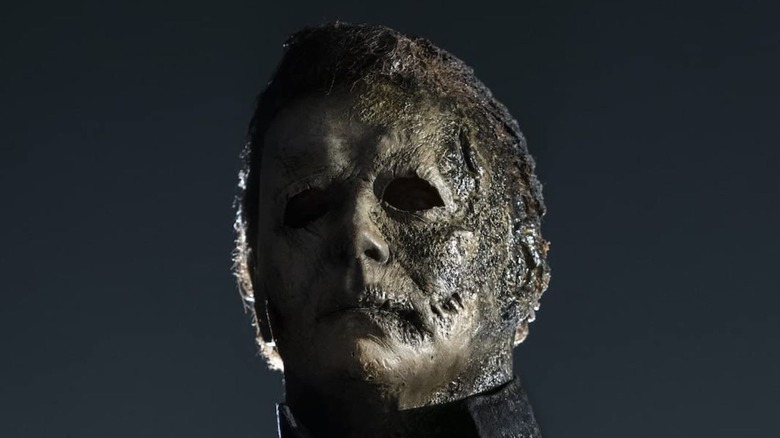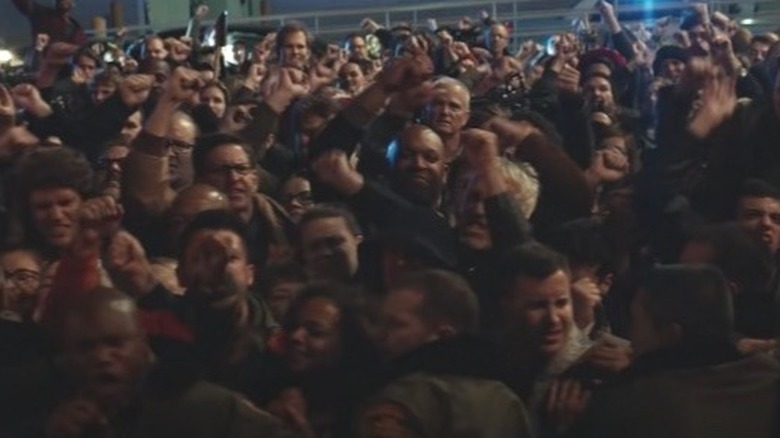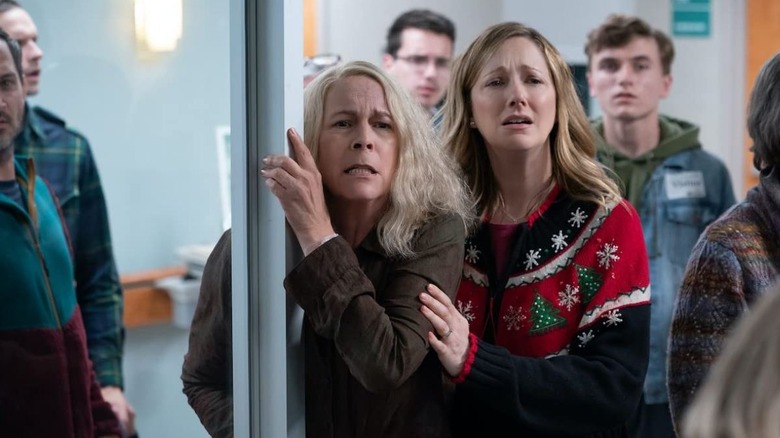Here's How COVID Affected The Tone Of Halloween Kills
A year after it was supposed to be released in theaters, "Halloween Kills" is finally available for the moviegoing masses. The first of two sequels to the 2018 version of "Halloween," "Halloween Kills" — like countless other film releases — was delayed after the COVID-19 pandemic wreaked havoc on public health and the world economy as theaters around the globe were shuttered for months.
In the span of time after COVID placed its firm grip on the world in March 2020, the way people were used to doing things had changed dramatically. Offices in the United States and abroad were shut down, and workers completed their tasks at home as online use skyrocketed. With stay-at-home orders paralyzing nations, internet use increased dramatically. Whether it was for work or play, cyberspace eventually began to reflect the frustration of people locked down in their houses or apartments for months, and in some instances, that frustration turned to rage in the form of social media.
Now that "Halloween Kills" is finally being unleashed in theaters and simultaneously released on the Peacock streaming app, fans may experience a familiar feeling while watching the film, even though production on it was essentially completed before COVID began. In a twisted coincidence, the pent-up anger of the mob mentality in "Halloween Kills" concurrently began to take shape in real life over the past year and a half.
The lynch mob in Halloween Kills feels like the personification of Twitter
Set immediately after the events of its 2018 predecessor, "Halloween Kills" begins with the escape of Laurie Strode (Jamie Lee Curtis), her daughter, Karen (Judy Greer) and granddaughter, Allyson (Andi Matichak), from Laurie's compound. Laurie's house is burning down with masked murderer Michael Myers (James Jude Courtney and Nick Castle) trapped inside, but since The Shape — as Michael is also known — is described as evil personified — he seemingly cannot be killed.
Continuing his murderous rampage in his hometown of Haddonfield, Illinois, Michael not only intends to kill Laurie and her family but also the young survivors of his massacre seen in the original "Halloween". But those survivors, led by Tommy Doyle (Anthony Michael Hall), are determined to kill Michael before he can kill them, and form a lynch mob that is intensified by the escalating shouts of "Evil Dies Tonight!"
Before too long, the mob becomes blinded by their ambitions, and knee-jerk reactions in their surroundings lead to unintended consequences. Effectively, the mob scene feels like the personification of Twitter, and their hashtag is #EvilDiesTonight.
"I think the last 18 months have changed my perception on just about everything, including all three 'Halloween' movies, but I don't know if I can really articulate how it changed my perception about that particular aspect of the movie," observed producer Jason Blum in an interview with The Hollywood Reporter. "If anything, online, with everyone being isolated, the mob mentality and jumping on truths and untruths, it happens more quickly now. And as a result of being so isolated, people cling to each other, digitally, over the last 18 months more than they ever have. And I think the movie is a physical manifestation of that, so maybe that's one way it has."
The road to hell is paved with good intentions
While it initially seems within reason for a mob to form to stop Michael from perpetrating more carnage, the tragic complications that go along with their actions seem to resonate more now than when "Halloween Kills" was filmed, director David Gordon Green said in the dual THR interview with Blum.
"It is interesting to have shot this movie two years ago, and then, last year, when the movie was supposed to come out, I was like, 'Oh, this movie feels kind of relevant and topical now, which is kind of interesting considering we had written it two years ago.' And then now, even more so," Green told the outlet. "So, I do feel it's exactly what Jason said. It's difficult to decipher what's real and what's not. You can enter a situation with the best of intentions, and then once that animal mentality of a mob can take over, those intentions can get really blurry. And if there's anything this movie does have to say that's relevant, it's where that line is blurred between good and evil."
Even with its blurry definitions, good will confront evil once more when Blum and Green's "Halloween" trilogy comes to a conclusion with "Halloween Ends," when it is released on October 14, 2022. "Halloween Kills" opens in theaters and streams exclusively on Peacock on October 15.


